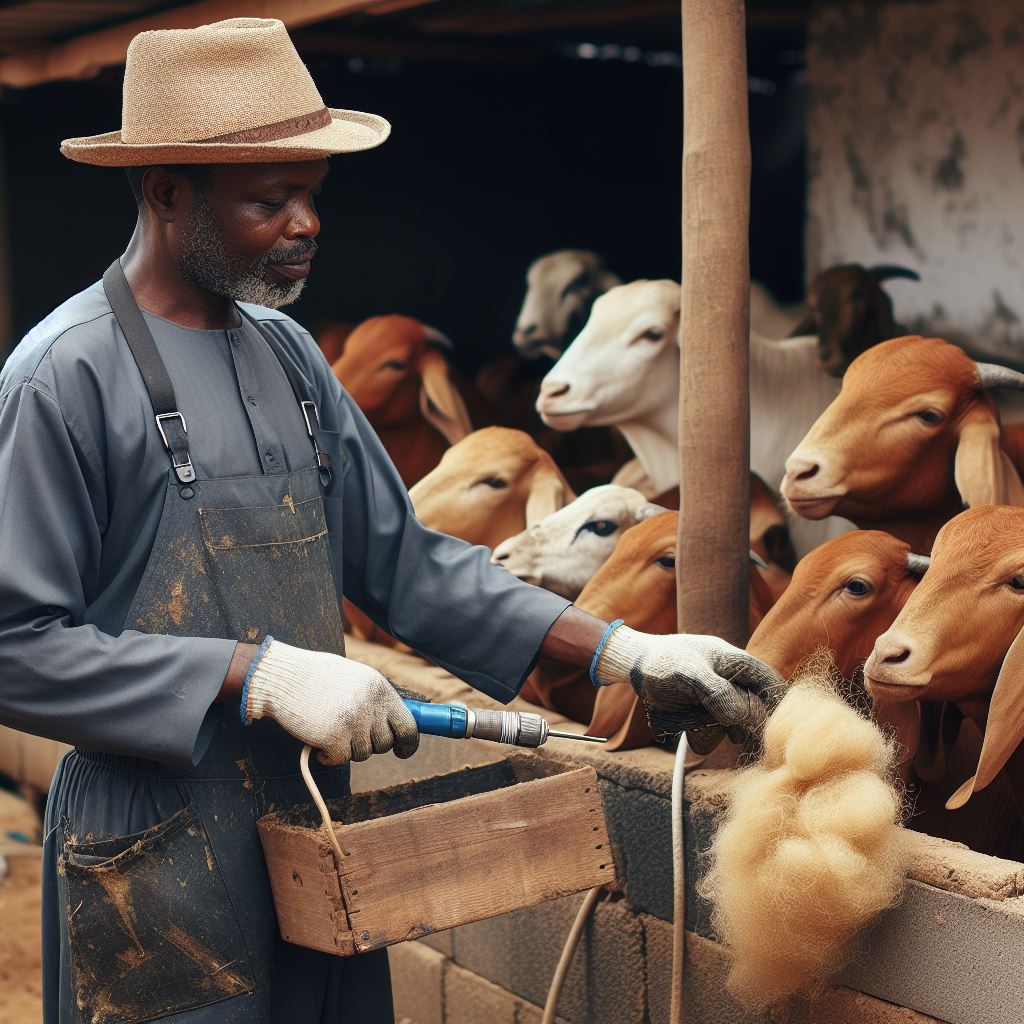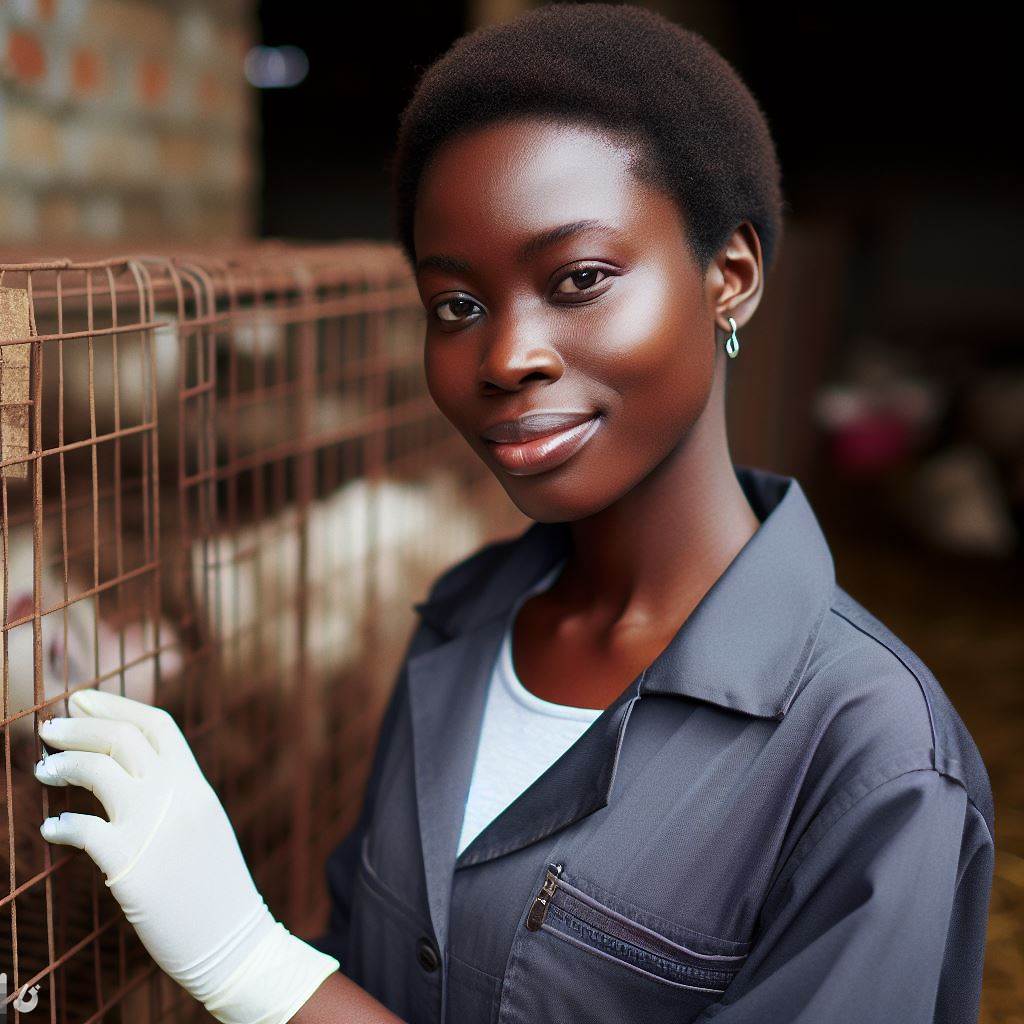Introduction
Animal genetics is the study of heredity in animals, focusing on genes, traits, and breeding patterns.
Importance of Studying Animal Genetics in Nigeria
Understanding animal genetics is pivotal in enhancing livestock quality, disease resistance, and production efficiency in Nigeria’s agricultural sector.
Advancements in genetic research have revolutionized animal breeding methods, fostering better yields and healthier livestock.
Animal genetics contributes to the development of robust and disease-resistant breeds, vital for Nigeria’s agricultural sustainability.
Studying this field enables professionals to apply genomic technologies, improving livestock traits and productivity.
Moreover, it aids in conserving endangered species and preserving genetic diversity in Nigeria’s animal population.
Animal geneticists play a crucial role in addressing challenges such as food security and sustainable agriculture.
The demand for skilled animal geneticists is rising, creating numerous career opportunities in Nigeria’s livestock industry.
Professionals equipped with expertise in animal genetics can work in research institutions, universities, and governmental agencies.
Additionally, they can venture into private consulting, offering services to livestock farmers and breeding companies.
Animal genetics graduates can explore roles in pharmaceutical firms, contributing to drug development for animal health.
Entrepreneurial avenues like establishing breeding programs or genetic consultancy services present promising career paths.
In essence, studying animal genetics in Nigeria presents multifaceted career prospects in agriculture, research, consultancy, and entrepreneurship.
This post aims to explore and guide individuals aspiring to excel in this dynamic field.
Remember, the study of animal genetics isn’t just a career choice; it’s a gateway to revolutionizing Nigeria’s livestock industry.
Overview of Animal Genetics as a field
Definition and Scope of Animal Genetics
Animal Genetics is a branch of genetics that focuses on the heredity and variation in animals.
It explores how traits are passed down from parents to offspring and how genetic factors influence animal health, behavior, and physical characteristics.
The scope of Animal Genetics is vast, covering numerous animal species and their genetic makeup.
Sub-disciplines within Animal Genetics
Animal Genetics encompasses several sub-disciplines that help in understanding genetic aspects related to animals.
These sub-disciplines include population genetics, molecular genetics, quantitative genetics, evolutionary genetics, and comparative genomics.
Each sub-discipline focuses on specific genetic aspects and contributes to our overall understanding of Animal Genetics.
Role in advancements in agriculture and animal breeding
Animal Genetics has a significant role in advancements in agriculture and animal breeding.
By studying animal genetics, researchers and professionals can improve animal breeding practices, develop disease-resistant breeds, and enhance overall animal productivity.
It helps in identifying desirable traits and developing breeding programs to achieve specific goals, such as increased milk production, meat quality, or resistance to diseases.
Career Opportunities after Studying Animal Genetics in Nigeria
- Animal Geneticist: With a degree in Animal Genetics, you can work as an animal geneticist, conducting research and implementing breeding programs to improve the genetics of livestock.
- Genomic Scientist: You can pursue a career as a genomic scientist, analyzing DNA sequences and conducting genomic research to understand genetic variations in animal species.
- Animal Breeder: Animal breeding is an important field where knowledge of animal genetics is crucial.
As an animal breeder, you can work to selectively breed animals to improve desirable traits such as milk production, meat quality, or disease resistance. - Biotechnologist: Animal Genetics knowledge can also lead you to a career in biotechnology, where you can work on developing new techniques and technologies for manipulating animal genetic material, such as cloning or genetic modification.
- Research Scientist: With further studies and specialization, you can become a research scientist, working in universities, research institutions, or government agencies to advance our understanding of animal genetics and contribute to scientific discoveries.
In fact, studying Animal Genetics in Nigeria opens up a wide range of career opportunities.
From animal geneticists to biotechnologists, there are various paths you can take to contribute to advancements in agriculture and animal breeding in the country.
Read: Top Nigerian Universities Offering Animal Breeding & Genetics
Importance of Animal Genetics in Nigeria
Contribution to livestock production and improvement
- Animal genetics play a crucial role in enhancing livestock production in Nigeria.
- By selectively breeding animals with desirable traits, farmers can improve the quality and productivity of their herds.
- This includes traits like increased milk production, meat quality, and disease resistance.
- The application of animal genetics in livestock breeding helps to create healthier and more productive animals.
- Improved genetics lead to increased meat and milk yield, ultimately benefiting farmers and the agricultural industry.
Impact on disease resistance and genetic diversity
- Animal genetics also has a significant impact on disease resistance in livestock.
- By understanding the genetic makeup of animals, researchers can identify genes associated with disease resistance.
- Through selective breeding, animals can be bred to have a higher natural resistance to diseases.
- This reduces the need for excessive use of antibiotics and other medications, resulting in more sustainable farming practices.
- Furthermore, animal genetics helps to preserve and increase genetic diversity in livestock populations.
Potential for economic growth in the agricultural sector
- The field of animal genetics offers immense potential for economic growth in Nigeria’s agricultural sector.
- With improved genetics, farmers can produce higher-yielding animals, leading to increased profitability.
- Additionally, the demand for improved breeds and high-quality animal products opens up opportunities for entrepreneurship.
- Animal geneticists can provide valuable services such as breeding consultancy, genetic testing, and advisory roles.
- This leads to job creation and the development of a skilled workforce in the animal genetics sector.
Conservation of endangered animal species
- Animal genetics also plays a vital role in the conservation of endangered animal species in Nigeria.
- By understanding the genetic diversity within these species, conservationists can develop effective breeding programs.
- These programs aim to maintain and increase the genetic diversity of endangered animals to ensure their long-term survival.
- Through technologies such as artificial insemination and embryo transfer, genetic material can be preserved and propagated.
- Animal genetics offers hope for the conservation of endangered species and the preservation of biodiversity in Nigeria.
In short, animal genetics holds immense importance in Nigeria.
It contributes significantly to livestock production and improvement by enhancing traits and productivity.
Animal genetics also plays a crucial role in disease resistance, genetic diversity, and conservation efforts.
Moreover, it offers potential economic growth in the agricultural sector through increased profitability and job creation.
The application of animal genetics in Nigeria has far-reaching benefits that extend to livestock farmers, the agricultural industry, and conservationists alike.
Read: The Role of Technology in Modern Animal Nutrition Education in Nigeria
Career opportunities in Animal Genetics in Nigeria
Animal genetics is a specialized field that offers a wide range of career opportunities in Nigeria.
Graduates of animal genetics can pursue various paths in academia, research, consultancy, government, and the private sector.
Academic and research positions in universities and research institutions
After studying animal genetics in Nigeria, individuals can seek academic and research positions in universities and research institutions.
These roles involve conducting cutting-edge research, teaching students, and contributing to the academic community.
Animal genetics researchers play a crucial role in understanding genetic traits and improving animal breeding programs.
They explore topics such as genetic diseases, traits related to production, and genetic diversity in different animal populations.
By joining universities and research institutions, animal genetics graduates can contribute to expanding knowledge in the field and training future generations of geneticists.
Transform Your Career with Expert Guidance
Get personalized mentorship consulting that’s tailored to your unique path. Our expert advice is actionable and exclusive.
Get StartedAnimal genetics consultancy roles for farming and breeding companies
Another career opportunity for animal genetics graduates in Nigeria is working as consultants for farming and breeding companies.
These roles involve providing expert advice on breeding strategies, genetic selection, and improving animal production.
Consultants collaborate with farmers and breeding companies to optimize breeding programs and maximize productivity.
They analyze genetic data, develop breeding plans, and implement genetic improvement strategies based on specific goals and objectives.
Animal genetics consultants can make a significant impact on the efficiency and profitability of farming and breeding operations, helping to produce high-quality animals with desirable traits.
Government employment in agriculture and veterinary departments
The Nigerian government offers numerous employment opportunities for animal genetics graduates in agriculture and veterinary departments.
These roles involve working on policies, regulations, and programs related to animal breeding and genetics.
Government-employed animal geneticists can contribute to the development and implementation of initiatives aimed at improving animal health, productivity, and genetics.
They may be involved in designing breeding programs, analyzing data for policy-making, and promoting sustainable livestock production.
By working in the government sector, animal genetics professionals can contribute to the overall development of the agricultural industry in Nigeria.
Career opportunities in biotechnology and pharmaceutical companies
Animal genetics graduates in Nigeria can also explore career opportunities in biotechnology and pharmaceutical companies.
These companies often conduct research and develop products related to animal genetics, such as vaccines, gene therapies, and diagnostic tools.
Working in biotechnology and pharmaceutical companies, animal genetics professionals can contribute to the development of innovative solutions for animal health and genetic improvement.
They may be involved in research and development, product testing, quality control, and regulatory affairs.
These roles offer a unique opportunity to apply scientific knowledge in a commercial setting and make a tangible impact on the animal health and agriculture industry.
Entrepreneurial opportunities in animal breeding and genetics services
For those with an entrepreneurial spirit, studying animal genetics in Nigeria can open doors to starting their own businesses in animal breeding and genetics services.
Entrepreneurs can provide services such as genetic consulting, breeding program management, genetic testing, and the sale of genetically improved animals.
They can establish their own breeding facilities or collaborate with existing farms and breeding operations.
By leveraging their expertise in animal genetics, entrepreneurs can contribute to the development of sustainable and profitable breeding programs while meeting the increasing demand for quality animals.
In general, studying animal genetics in Nigeria offers diverse and rewarding career opportunities.
Graduates can pursue academic and research positions, work as consultants, contribute to government initiatives, join biotechnology companies, or establish their own entrepreneurial ventures in the field.
Read: The Evolution of Animal Breeding Studies in Nigeria: A Historical View

Required qualifications and skills
Animal genetics is a rapidly growing field in Nigeria, offering numerous career opportunities for individuals with the right qualifications and skills.
Education and degree requirements
To enter the field of animal genetics, aspiring professionals need to acquire a Bachelor’s degree in genetics or a related discipline.
This provides them with a solid foundation in the principles and concepts of genetics.
Knowledge in genetics and genomics
Professionals in animal genetics must possess a deep understanding of genetics and genomics.
They need to be knowledgeable about genetic variation, inheritance patterns, and genetic diseases in animals.
Furthermore, they must stay updated with the latest advancements in technologies such as next-generation sequencing, genotyping, and bioinformatics used in animal genomics research.
Laboratory skills and research experience
Having laboratory skills and experience in research is necessary for successful careers in animal genetics.
Professionals need to be proficient in techniques such as DNA extraction, PCR, and DNA sequencing.
They should also have hands-on experience in designing and conducting experiments, data analysis, and interpretation of results.
Research experience helps individuals develop critical thinking and problem-solving abilities.
Communication and analytical skills
Effective communication is vital in the field of animal genetics.
Professionals need to be able to present their research findings, write scientific papers, and collaborate with colleagues and stakeholders such as farmers, veterinarians, and policymakers.
Analytical skills are also necessary for data interpretation and drawing valid conclusions.
Professionals must be able to think critically, analyze complex genetic data, and make sound decisions based on evidence.
With the right qualifications and skills, individuals who have studied animal genetics in Nigeria can explore various career opportunities:
- Geneticist: Work in research institutions or companies, studying genetic traits and diseases in animals and developing breeding strategies.
- Animal genetics consultant: Provide expert advice to farmers, livestock breeders, or animal health organizations on breeding programs and genetic improvement.
- Laboratory technician: Work in genetics laboratories, assisting in research activities, conducting tests, and maintaining laboratory equipment.
- Academic researcher: Pursue a career in academia, conducting research, publishing papers, and teaching animal genetics to future professionals.
- Veterinary genetics specialist: Work in veterinary clinics or animal hospitals, providing genetic counseling, and diagnosing genetic disorders in animals.
In review, a career in animal genetics in Nigeria requires specific qualifications and skills.
With a strong educational background in genetics, knowledge in genomics, laboratory skills, research experience, and communication and analytical abilities, individuals can explore various opportunities in the field.
Read: Postgraduate Opportunities in Animal Nutrition in Nigeria
Profiles of professionals in Animal Genetics in Nigeria
Success stories of individuals working in the field
- Dr. Adeola Ogunlade: Leading researcher in Animal Genetics at a prestigious Nigerian university.
- Olumide Adeleke: Established successful animal genetics consultancy firm, providing services to farmers and breeders in Nigeria.
- Funmilayo Ibrahim: CEO of a renowned animal genetics company, specialized in developing superior genetic traits in livestock.
- Chidi Okonkwo: Recognized as a pioneer in animal genetics research, credited with developing a resilient breed of chickens.
- Dr. Ngozi Obi: Established a thriving genetics laboratory, offering genetic testing and breeding services for various animal species.
Interviews with professionals in academia, research, and industry
- Professor John Akinyemi: Leading academic in Animal Genetics field, shares his experiences and insights into the career.
- Dr. Stella Eze: Research scientist working on genetic improvement of indigenous animal breeds, discusses her projects and findings.
- Chief Emmanuel Ojo: Industrial expert, explains the importance of animal genetics in optimizing livestock production and profits.
- Dr. Fatima Mohammed: Geneticist at a government research institute, reveals the challenges and opportunities in the field.
- Dr. Abdul Rahman: Founder of a private genetics research company, talks about the potential applications of animal genetics in Nigeria.
Demonstrating the range of career paths and accomplishments
- Veterinary Geneticist: Engage in research, develop breeding strategies, and provide genetic counseling to farmers.
- Genetic Engineer: Modify animal genomes to enhance desired traits for improved productivity and disease resistance.
- Genetic Consultant: Assist farmers and breeders in implementing genetic technologies for enhanced livestock performance.
- Genetic Laboratory Manager: Oversee genetic testing and analysis, ensuring accurate results for breeding programs.
- Academic Researcher: Conduct studies on animals’ genetic makeup, contributing to knowledge in the field.
- Industry Consultant: Advise companies on incorporating genetic advancements, maximizing profitability and quality of products.
- Government Geneticist: Work in regulatory bodies, developing policies and standards for animal genetics in Nigeria.
- Genetics Entrepreneur: Establish and manage genetic services or companies, catering to the needs of livestock breeders.
- Biotechnologist: Utilize biotechnological tools to manipulate animal genetic material for various purposes.
- Animal Geneticist Sales Representative: Promote and sell genetic products and services to farmers and livestock breeders.
In a nutshell, studying animal genetics in Nigeria opens up a diverse range of career opportunities.
Profiles of successful professionals in the field, interviews with experts, and examples of various career paths demonstrate the potential in this burgeoning industry.
From academia to industry, individuals can make significant contributions to animal genetics and play a vital role in improving livestock breeding and production in the country.
Challenges and future prospects for Animal Genetics professionals in Nigeria
Limited research funding and infrastructure
Animal Genetics professionals in Nigeria face significant challenges due to limited research funding and inadequate infrastructure.
The lack of financial support hinders their ability to conduct cutting-edge research and develop innovative solutions.
Without adequate funding, Animal Genetics professionals struggle to access essential research materials, advanced laboratory equipment, and modern technologies.
This limitation hampers their ability to make significant advancements in the field and contribute to global scientific knowledge.
Integration of traditional knowledge with modern genetic techniques
Incorporating traditional knowledge with modern genetic techniques is an essential aspect of enhancing Animal Genetics research in Nigeria.
Indigenous knowledge and practices can provide valuable insights into local animal breeds and their genetic makeup.
By combining traditional knowledge with modern genetic techniques, Animal Genetics professionals can develop strategies for conserving indigenous animal breeds, improving their productivity, and addressing specific challenges faced by Nigerian farmers.
This integration can lead to the development of sustainable and viable solutions for the country’s agricultural sector.
Collaboration and networking opportunities for growth
Animal Genetics professionals in Nigeria should actively seek collaboration and networking opportunities to foster growth in the field.
By engaging with international experts and institutions, they can access valuable resources, knowledge, and funding.
Collaborative projects can lead to the exchange of ideas, sharing of research methodologies, and joint efforts to tackle common challenges.
Additionally, networking provides opportunities for professional development, mentorship, and exposure to emerging trends and technologies in Animal Genetics.
Potential for policy interventions to support Animal Genetics
Policy interventions play a crucial role in supporting the development of Animal Genetics in Nigeria.
Government support through appropriate policies can help address the funding and infrastructure challenges faced by professionals in the field.
By allocating sufficient resources for research and infrastructure development, the government can create an enabling environment for Animal Genetics professionals to thrive.
This includes providing grants, establishing well-equipped research facilities, and promoting collaborations between scientists, farmers, and policymakers.
Moreover, policy interventions can facilitate the effective translation of scientific research into practical applications.
This involves incorporating Animal Genetics findings into agricultural policies, breeding programs, and livestock management strategies to enhance productivity, resilience, and sustainability in Nigeria’s agriculture sector.
Basically, Animal Genetics professionals in Nigeria face several challenges, including limited research funding, the need for integrating traditional knowledge with modern techniques, and the importance of collaboration and networking opportunities for growth.
However, there is tremendous potential for policy interventions and support to address these challenges and pave the way for a promising future in the field of Animal Genetics in Nigeria.
Conclusion
Summary of Career Opportunities and Benefits
Animal Genetics in Nigeria unlocks diverse career pathways. Geneticists delve into research, driving advancements in livestock breeding.
Veterinarians equipped with genetics expertise diagnose and manage hereditary diseases, enhancing animal health.
Agricultural consultants optimize breeding strategies, aiding farmers for higher-yield livestock.
Biotechnologists pioneer innovations, applying genetic principles to enhance animal traits, benefitting the agricultural sector.
Moreover, academic avenues beckon—professorial roles, educating the next generation of geneticists.
Governmental positions offer opportunities to shape policies, fostering sustainable agricultural practices.
This field’s significance extends beyond professional realms.
It fosters national food security, elevates economic growth, and promotes sustainable farming practices, ultimately benefiting society at large.
Encouragement to Explore and Pursue
Prospective students, envision a dynamic field awaiting exploration.
Embrace the power of animal genetics to revolutionize agriculture. Seek education and hands-on experiences to carve a niche.
Dive into internships, research projects, and specialized courses.
Engage with industry professionals, learning the ropes firsthand. Embrace challenges; they pave the way for innovation and growth.
By immersing oneself in this field, doors to a myriad of possibilities swing open. Embrace the journey of learning, fueling curiosity and passion.
Call to Action for Support and Investment
Nigeria’s Animal Genetics domain needs collective support.
Investment in research infrastructure, funding for academic programs, and collaboration among stakeholders are imperative.
Government bodies, private enterprises, and educational institutions must join forces.
Invest in cutting-edge technologies and promote interdisciplinary collaborations.
Support initiatives advocating ethical practices and sustainable approaches.
Encourage partnerships fostering knowledge exchange, amplifying the impact of Animal Genetics in Nigeria.
The potential of Animal Genetics in Nigeria is boundless.
Embrace this burgeoning field, fueling innovation and driving sustainable agricultural practices.
Together, let’s catalyze advancements, ensuring a prosperous future for our nation’s agriculture.




